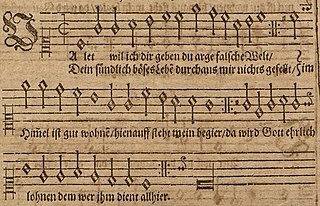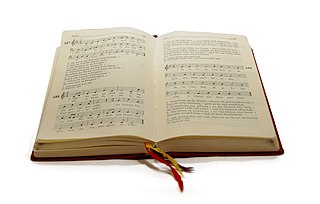Related Research Articles

"Valet will ich dir geben" is a Lutheran hymn written by Valerius Herberger in 1613. It is a Sterbelied. The text was published with two hymn tunes by Melchior Teschner, Zahn Nos. 5403 and 5404a, in 1615. The second of these melodies was used in compositions such as chorale preludes by Johann Sebastian Bach and Max Reger. Bach used single stanzas in vocal works, including his St John Passion.
Melchior Teschner was a German cantor, composer and theologian.

Gotteslob is the title of the hymnbook authorized by the Catholic dioceses in Germany, Austria, South Tyrol, Luxembourg and Liège, Belgium. First published in Advent 2013, it is the current official hymnal for German-speaking Catholics, succeeding the first common German hymnal, the 1975 edition of the same name. Each diocese published a book containing a common section and a regional section. The first editions amounted to around 4 million copies.

The 1975 edition of Gotteslob was the first combined prayerbook and hymnbook authorised by the bishops of all German-speaking Roman Catholics in Germany and Austria. It contains texts and songs for liturgy, communal prayer and private prayer, divided into a section which is common for all, and an appendix for the local songs in a diocese.

Georg Thurmair was a German poet and hymnwriter who wrote around 300 hymns, a writer, journalist and author of documentary films.

Kirchenlied is a German Catholic hymnal published in 1938. It was a collection of 140 old and new songs, including hymns by Protestant authors. It was the seed for a common Catholic hymnal which was realised decades later, in the Gotteslob (1975).
"Der Geist des Herrn erfüllt das All" is a Christian hymn for Pentecost by Maria Luise Thurmair, written in 1941. First printed in 1946, it appeared with a 1609 melody by Melchior Vulpius in the German Catholic hymnal Gotteslob in 1975 as GL 249. It has been included in ecumenical hymnals and songbooks.
"Nun singe Lob, du Christenheit" is a Christian hymn by Georg Thurmair, set to a 1653 melody by Johann Crüger. It is a song of praise, focused on unity within the church. The hymn in five stanzas of for lines each was written in 1964, revised in 1967. It is part of the current Catholic hymnal Gotteslob as GL 487, in the section "Kirche – Ökumene".

"Lobet den Herren alle, die ihn ehren" is a sacred morning song with a text by Paul Gerhardt and a melody by Johann Crüger, who first published it in the fifth edition of his hymnal Praxis pietatis melica in 1653. The Lutheran hymn is still popular and appears in hymnals including the Protestant Evangelisches Gesangbuch and the Catholic Gotteslob.
"Herr, dir ist nichts verborgen" is a Catholic hymn by Maria Luise Thurmair, based on Psalm 139 and set to a 1582 melody by Kaspar Ulenberg. The hymn in five stanzas of seven lines each was written in 1973. It appeared in the Catholic hymnal Gotteslob in 1975 as GL 292. In the current Gotteslob, it is GL 428, in the section "Vertrauen und Trost".

"Dein Lob, Herr, ruft der Himmel aus" is a German Catholic hymn. Adolf Lohmann adapted a 1659 hymn by the Jesuit astronomer Albert Curtz, who paraphrased Psalm 19. The melody appeared in Augsburg in 1669. It was No. 1 in the 1938 hymnal Kirchenlied and is part of the German Catholic hymnal Gotteslob as GL 381.
"Nun lässest du, o Herr" is a Christian hymn by Georg Thurmair written in 1966 as a paraphrase of the Nunc dimittis canticle. It was part of the German Catholic hymnal Gotteslob of 1975 as GL 660 with a 16th-century melody by Loys Bourgeois. With this melody, it is also part of the Protestant hymnal Evangelisches Gesangbuch as EG 695. It is part of the second edition of the Gotteslob as GL 500, with a new 1994 melody.
"O Licht der wunderbaren Nacht" is a Christian Easter hymn by Georg Thurmair written in 1963. It was part of the German Catholic hymnal Gotteslob of 1975 as GL 208, with a melody from the 14th century. It is part of the second edition of the Gotteslob as GL 334, also of regional sections of the Protestant hymnal Evangelisches Gesangbuch.
"Nun singt ein neues Lied dem Herren" is a Christian hymn with German text by Georg Thurmair. He based it on Psalm 98 and wrote it in 1967 to match a traditional 16th-century melody. The song is part of German hymnals, including Gotteslob, and songbooks.
"Erfreue dich, Himmel, erfreue dich, Erde" is a Christian hymn in German. The current hymn, part of modern hymnals and song books, was written by Maria Luise Thurmair in 1963 as a Psalmlied based on Psalm 148 which deals with praise of God from his creatures. She wrote it using and expanding a short Christmas carol from the 17th century. She retained the first stanza completely and used its second half as a refrain. She also retained the old melody.

"Mit Ernst, o Menschenkinder" is an Advent hymn by Valentin Thilo. It partly paraphrases the call to penitence by John the Baptist. The text was first published in 1642 in the collection Preußische Festlieder. The different melody that later became popular dates back to 1557.
"Nun saget Dank und lobt den Herren" is a Christian hymn in German, paraphrasing Psalm 118. The German text was originally written by Ambrosius Lobwasser in the 16th century as a translation, meant to match the music from the French Genevan Psalter. It was rewritten and shortened in the 20th century by Peter Enderlin to be used in a hymnal of the Swiss Reformed Church. The song is included in German hymnals of various denominations.
"Lasst uns loben, freudig loben" is a Christian hymn in German. It was written by Georg Thurmair in 1948, then beginning "Laßt uns loben, Brüder, loben". The melody was composed by Erhard Quack the same year. It is part of the Catholic hymnal Gotteslob (2013) and other hymnals.
"Ich lobe meinen Gott, der aus der Tiefe mich holt" is a 1979 Christian hymn with words in German by Hans-Jürgen Netz and a melody by Christoph Lehmann. This Neues Geistliches Lied song has appeared in the German Protestant and Catholic hymnals. It is a preferred song for conventions such as Kirchentag.
"Lobet und preiset, ihr Völker, den Herrn" is a round for three parts to a German text based on three psalms. The melody has been passed orally. The round, a general expression of praise, is part of many hymnals and songbooks, and used for many occasions. It is easy and also suitable for children and young adults.
References
- 1 2 Gotteslob 2013.
- 1 2 Liederdatenbank 2017.
- ↑ Limburg 2013.
- ↑ Gotteslob 2017.
- ↑ Chants 2017.
- 1 2 Marti 2017, p. 93.
- ↑ Petroll 2007.
- ↑ Butz 2017.
- ↑ Bärenreiter 2013.
Sources
- Marti, Andreas (2017). "523 Valet will ich dir geben". In Evang, Martin; Alpermann, Ilsabe (eds.). Liederkunde zum Evangelischen Gesangbuch, Heft 4. Vandenhoeck & Ruprecht. pp. 88–95. ISBN 9783647503462.
- Bläserbuch zum Gotteslob / Vorspiele und Begleitsätze zu Liedern des neuen Gotteslob (in German). Bärenreiter.
- Den Herren will ich loben (PDF) (in German). Dr. J. Butz.
- "A Dieu va ma louange". chants-protestants.com (in French). 2017.
- "Den Herren will ich loben (L) / Leben in Gott – Lob, Dank und Anbetung" (in German). mein-gotteslob.de. Retrieved 15 October 2017.
- Den Herren will ich loben (in German). Gotteslob. 2013.
- "Teschner, Melchior – Den Herren will ich loben : für gem Chor, Trompete in C und Pauken / Partitur" (in German). Die Christliche Liederdatenbank. 2017.
- "Teschner, Melchior – Den Herren will ich loben : für gem Chor, Trompete in C und Pauken / Partitur" (in German). Noten Petroll. 2007. Archived from the original on 20 October 2017.
- "Numerisches Verzeichnis der Gesänge im GL 2013 mit Hinweis auf enthaltene Gesänge des GL 1974" (PDF) (in German). Diocese of Limburg. 2013. Retrieved 5 October 2017.